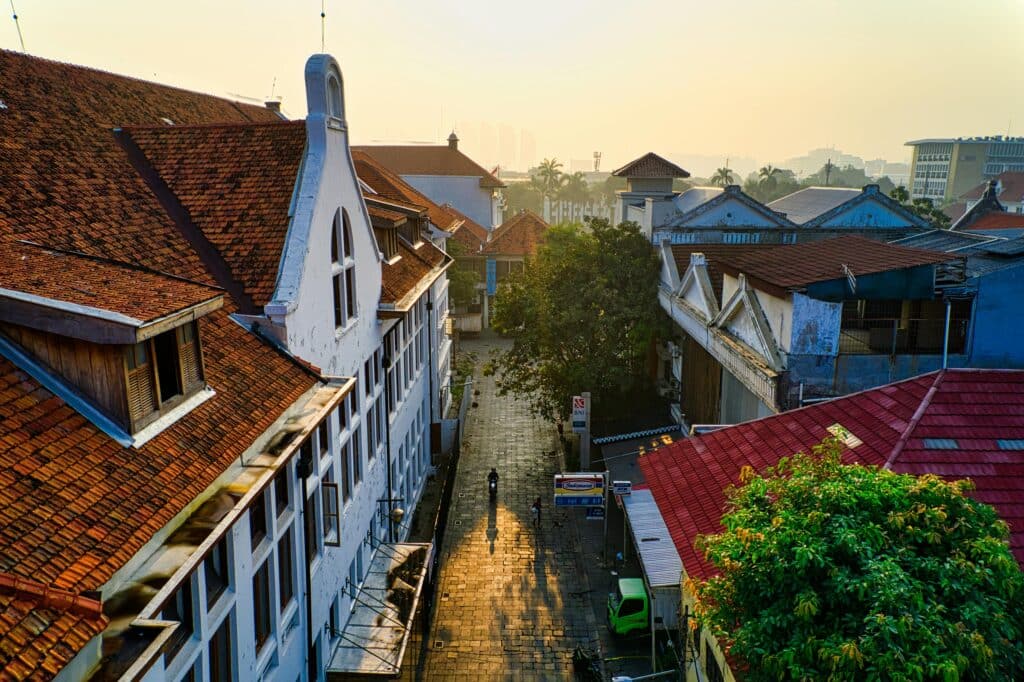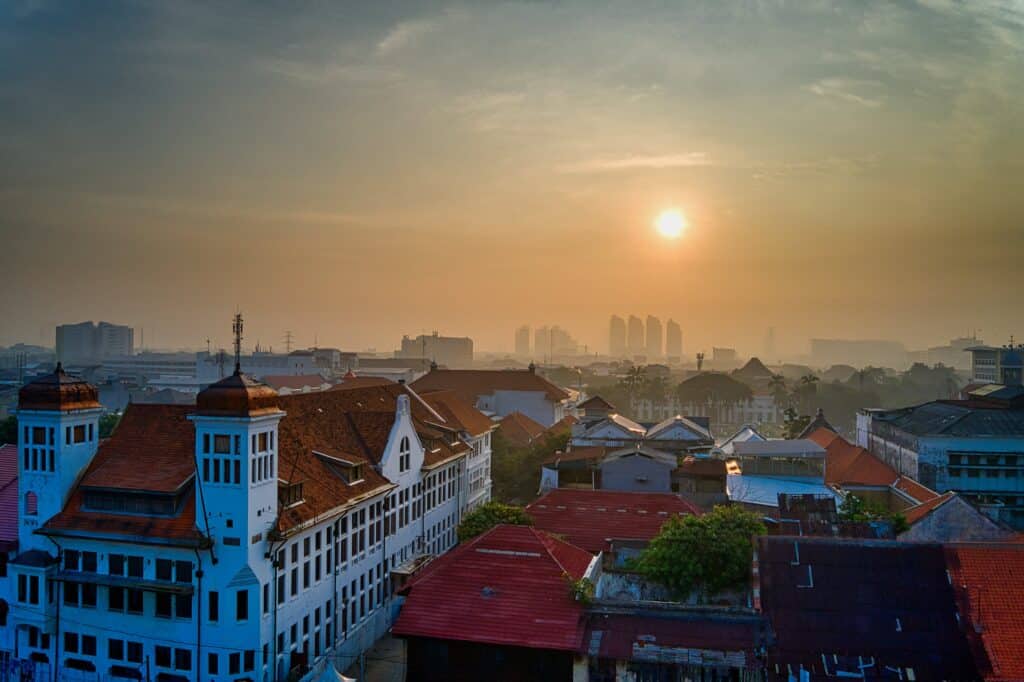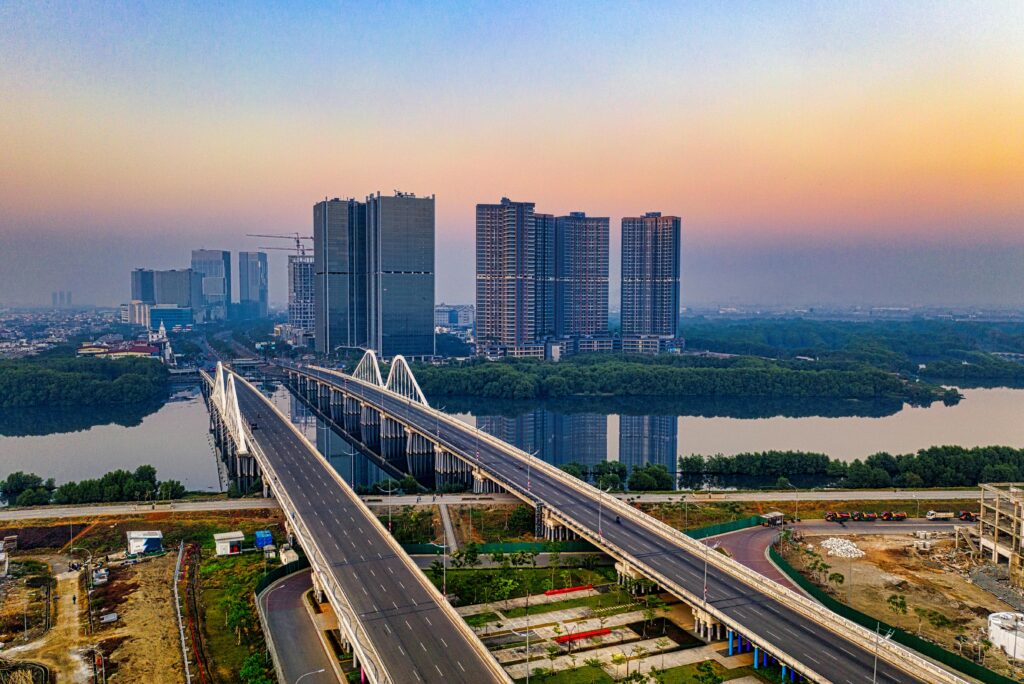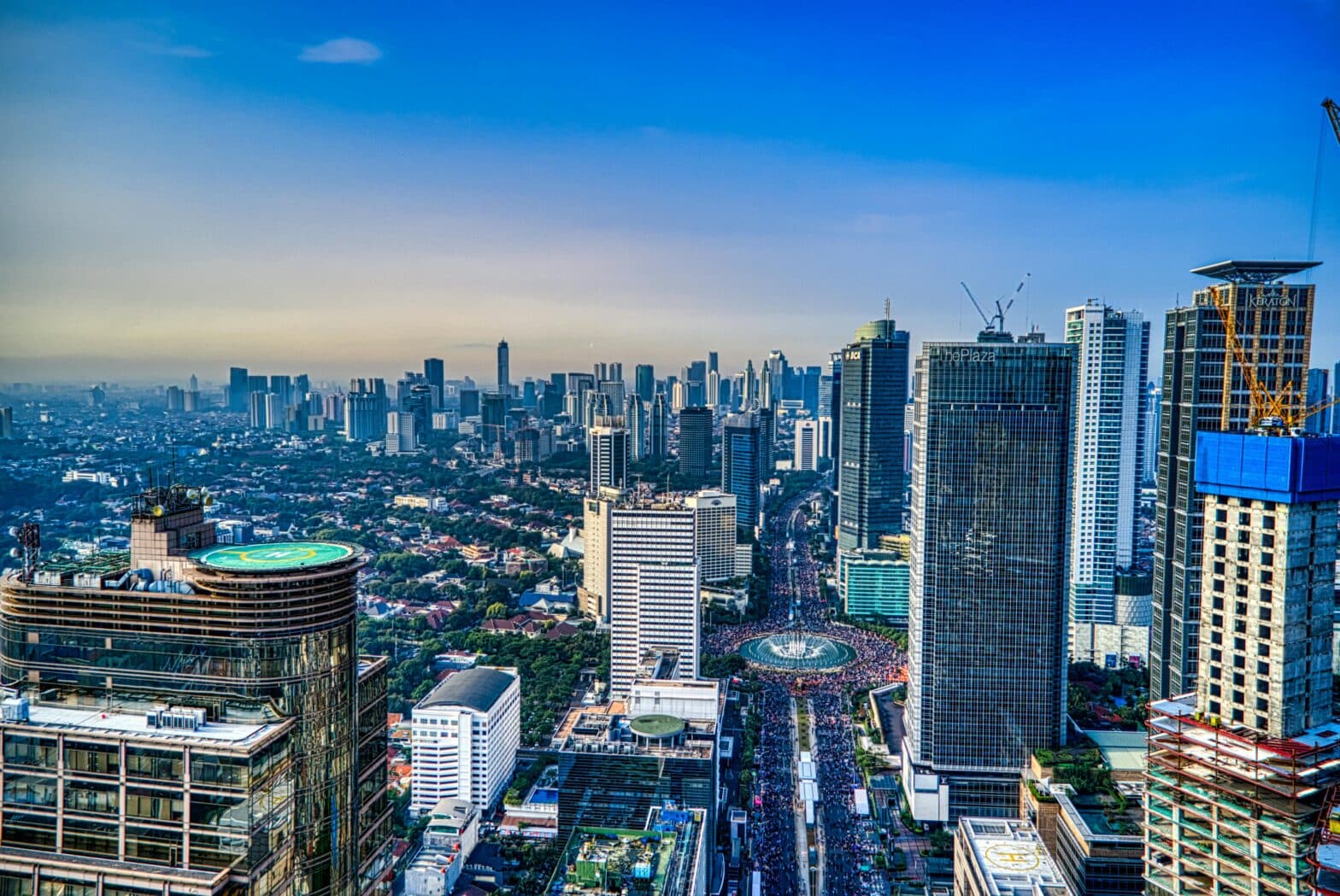Jakarta, Southeast Asia’s largest metropolis, where tradition meets modernity, awaits you.The extraordinary economic and cultural dynamism of this sprawling city makes it a popular destination for thousands of expatriates looking for a change of scenery and opportunities.
Foyer Global Health has prepared a practical guide to help you settle into your new life on the banks of the Ciliwung River!
Living in Jakarta: pros & cons
The advantages
- Affordable cost of living compared to other Asian cities such as Singapore
- A cosmopolitan city, home to the largest number of expatriates in the country (over 138,000)
- A comfortable lifestyle
- A cultural and culinary diversity – Indonesia is home to over 300 ethnic groups
- Excellent international schools
- Job opportunities (Jakarta is the economic heart of the archipelago)
- An excellent base for exploring the region
The disadvantages
- Air and water pollution
- Congestion: traffic is very heavy!
- Language barrier: although English is spoken at work in multinational companies, a basic knowledge of Indonesian is essential for everyday life.
Is Jakarta a dangerous city?
No, Jakarta is not a particularly dangerous city. However, as in other major cities, be aware of petty crime such as pickpocketing and credit card fraud.
Accommodation in Jakarta
There is a wide variety of accommodation and neighbourhoods in the former capital of Indonesia. Before you start looking, remember the traffic problem, and choose an area/neighbourhood that is close to your workplace and/or your children’s school.

How do I find accommodation?
Recalling that language is an issue in everyday life, many expats use their employer, a local estate agent or a trusted local contact. You can also consult sites such as Jendela360 or get in touch with expatriate networks.
Most expatriates choose to rent rather than buy, as Indonesian legislation makes it extremely difficult for foreigners to buy property.
Accommodation: What’s Available?

There is a wide variety of accommodation in Jakarta including villas, apartments, studios, rooming houses, etc. Some expatriates without children (including students) choose to rent a ‘ kost ’, an inexpensive type of accommodation (usually a fully-equipped room located in a building with a shared bathroom and kitchen).
How much does it cost?
Although rents are lower than in many major cities in Europe, North America and Asia, they are still among the most expensive in the country.
If you are able to pay several months’ rent, or even a whole year’s rent in advance, the landlord may be able to offer you more attractive prices. There’s no harm in asking and negotiating!
The average rent for an 85m2 apartment is around €1,300 per month.
Where to live in Jakarta
- Sudirman Central Business District (SCBD): The country’s business epicentre, the financial and commercial heart of Jakarta; one of the densest, most dynamic (and most upmarket) areas of the city; numerous skyscrapers, office buildings, shopping malls and plenty of restaurants and bars.
- Kuningan: One of Jakarta’s liveliest districts, with a vibrant nightlife, numerous shopping malls and tall buildings. Perfect for young expats and urban souls.
- Kemang: Cosmopolitan district in the south of the city, very popular with expat families and young professionals; many trendy boutiques, art galleries and modern cafés; relaxed atmosphere; great arts scene; wide range of accommodation.
- Pondok Indah: Ideal residential area for expatriate families (close to international schools) with spacious, modern accommodation; fairly far from the city centre; several shopping centres are to be found here such as the Pondok Indah Mall.
- Menteng: One of the oldest and most elegant districts in Central Jakarta was once the headquarters of the Dutch colonial authorities, it is now home to the residences of many high-ranking local and foreign officials, as well as many government institutions.
- Senayan: The ideal central district for young expats, with a mix of modern apartments, shopping malls and sports complexes.
- Cilandak: A residential area in the south of the city with an authentic Indonesian atmosphere, far from the city centre.
- Kebayoran Baru: Jakarta’s business district, home to multinational companies; convenient for expats working there.
- Kelapa Gading: A fast-growing district in the north of the city, offering affordable housing and many amenities. It is quite far from the centre, which can be a disadvantage if your employer is located elsewhere.

Working in Jakarta
Most expatriates in Indonesia work in Jakarta, the country’s financial and commercial centre, particularly in the tourism, import-export, energy (oil and gas), education, finance, information technology (which is booming in the country) and catering sectors.
It should be noted, however, that when it comes to employment in Indonesia, the government is very protective of the local population, who have priority access to jobs. In most sectors of activity, local companies must justify employing a foreigner rather than an Indonesian. Obtaining a work permit or authorisation to set up a business is a lengthy administrative process.
Most expats working in Jakarta have been seconded by their company, which has an office in the city. To find a job, you can contact specialist recruitment agencies, consult job search sites such as Jobs in Jakarta or JobStreet, or contact international companies based in Jakarta.

Salaries in Jakarta are lower than in other major Asian cities, but sufficient to live very comfortably in the country, especially as an expatriate.
Good to know:
- Networking is a key component of working in Jakarta.
- Hospitality, politeness and respect are important in Indonesian society, especially in the workplace.
- Respect for hierarchy and reputation is paramount in the Indonesian work culture so don’t rely too much on the horizontal management and collaborative egalitarianism found in Western start-ups, unless it’s really embedded in the culture of the multinational that employs you.
Daily life in Jakarta
Getting around
Jakarta’s roads are some of the busiest in the world, especially during rush hour (which can be quite long!). Many expats hire a driver or use convenient and inexpensive transport apps such as Go-Jek and Grab, as the size of the city means it’s not always easy to get around on foot. Others use the many public transport services such as the MRT Jakarta, LRT Jakarta and Transjakarta to get around.

Cost of living
Although the cost of living has risen sharply in recent years, it is still much lower than in nearby metropolises such as the city-state of Singapore, and half the cost of major European cities such as Paris. The biggest expenses are electricity, water, housing and education. For an 85m2 apartment, you can expect to spend around €100 per month on utilities (water, electricity, etc.), and an average of €1,300 on rent. Tuition fees can exceed €10,000 per year, depending on the school you choose.
Education: International schools in Jakarta
The former Indonesian capital is home to some of the best international schools in the archipelago, including:
Health in Jakarta
The Indonesian health system is based on public and private medical facilities, of which about twenty, mostly private, are accredited by the Joint Commission International. While progress has been made in the public sector (accessibility, medical equipment, quality of care), private medical facilities are more modern and offer much better medical care.

RSUP Persahabatan, Medistra Hospital, Siloam International Hospitals and National Cardiovascular Center (Harapan Kita Hospital) are among the best medical facilities in Jakarta.
However, for life-threatening emergencies and serious illnesses requiring specialist care, however, it is advisable to travel to Singapore or even Australia.
While expatriates have access to the Indonesian Health Insurance System (BPJS), most rightly opt for private international health insurance that is valid both in Indonesia and anywhere else in the world, and includes an evacuation plan in the event of a medical emergency.
